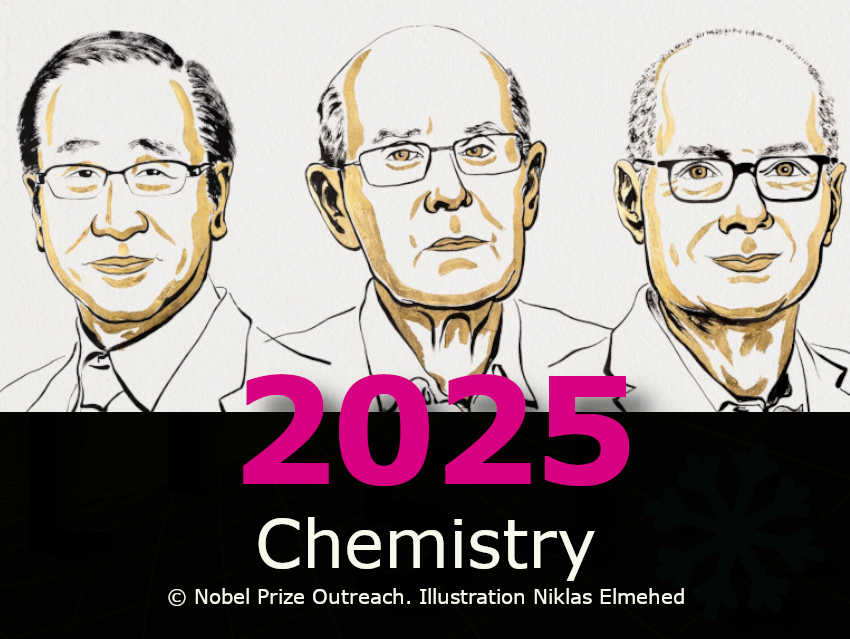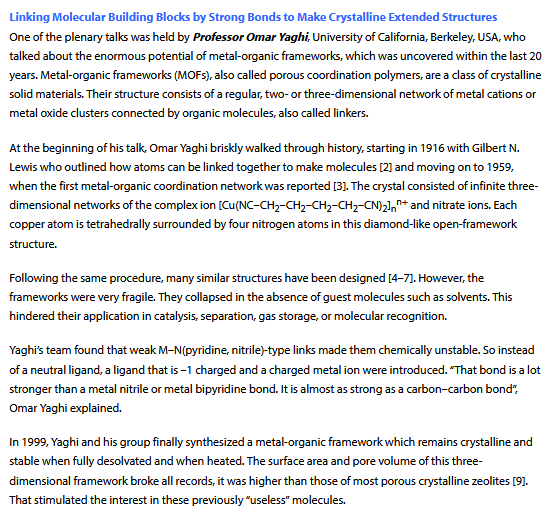The Nobel Prize in Chemistry 2025 has been awarded to
- Susumu Kitagawa, Kyoto University, Japan
- Richard Robson, University of Melbourne, Melbourne, Australia,
- Omar M. Yaghi, University of California, Berkeley, CA, USA, and
for “the development of metal-organic frameworks.” [1].
Metal–organic frameworks (MOFs) are porous materials composed of metal centers and organic linkers, forming highly crystalline structures with nanometer-sized pores and a large surface area and have tunable properties. Researchers have used them to harvest water from desert air, extract pollutants from water, capture carbon dioxide, and store hydrogen.
MOFs are classified as reticular materials. Reticular materials are crystalline, porous solids formed by linking molecular building blocks together with strong chemical bonds. This creates periodic structures with high surface areas and tailored functionalities. Other key examples include covalent organic frameworks (COFs), crystalline, porous materials built from organic building blocks linked by strong, reversible covalent bonds.
1 Research
In 1989, Richard Robson combined positively charged copper ions with a four-armed molecule, each arm ending in a group attracted to copper (tetracyanotetraphenylmethane linkers). The components bonded to form a well-ordered, spacious crystal, like a diamond filled with countless tiny cavities. However, the crystal was unstable and collapsed easily.
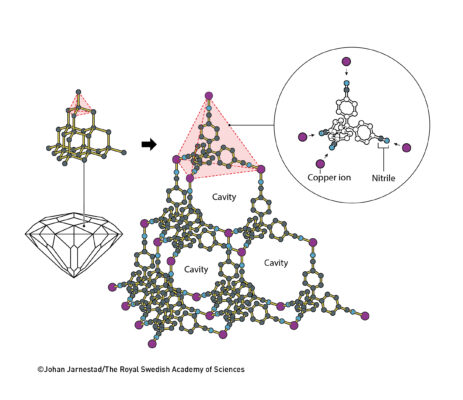
Between 1992 and 2003, Susumu Kitagawa and Omar Yaghi independently made a series of discoveries:
- Susumu Kitagawa demonstrated that gases can flow in and out of these structures (1997; cobalt ions and 4,4′-bipyridine linkers) and predicted that MOFs could be made flexible (1998).
- Omar Yaghi introduced the term metal–organic framework (MOF) in 1995, created MOF-5 (zinc clusters and 1,4-benzodicarboxylate linkers) in 1999—an exceptionally porous and stable material—and later demonstrated that MOFs could be rationally designed and modified to obtain new properties.
In the meantime, chemists have synthesized tens of thousands of different MOFs.
|
I remember that in 2018, Omar Yaghi gave an excellent plenary talk on MOFs at the EuChems Conference in Liverpool, UK, briefly touching on their history. For anyone interested, here is a summary of the talk; the references are linked in the original article. |
Laureates
Susumu Kitagawa, born 4 July 1951, in Kyoto, Japan, studied chemistry at Kyoto University, where he received his Ph.D. in 1979. He became an Assistant Professor at Kindai University, Japan, in 1979. Susumu Kitagawa was promoted to Lecturer in 1983 and to Associate Professor in 1988. He joined Tokyo Metropolitan University, Japan, in 1992 as Professor of Inorganic Chemistry and returned to Kyoto University as Professor in 1998. He has served there as Director of the Institute for Integrated Cell-Material Sciences since 2013.
Among other awards, Susumu Kitagawa has received the Humboldt Research Prize in 2008, the Chemical Society of Japan Award in 2009, and the 2017 Chemistry for the Future Solvay Prize. His research focuses on coordination chemistry and porous materials.
Richard Robson, born 4 June 1937 in Glusburn, in West Yorkshire, UK, studied chemistry at the University of Oxford, UK, where he received his Ph.D. in 1962. After postdoctoral research at the California Institute of Technology, USA, from 1962–1964 and at Stanford University, USA, from 1964–1965, he was appointed Lecturer in chemistry at the University of Melbourne, Australia, from 1966–1970, where he remained for the duration of his career.
Among other awards, Richard Robson received the 1998 Burrows Award from the Inorganic Division of the Royal Australian Chemical Institute (RACI) and was made a Fellow of the Australian Academy of Science in 2000. In 2022, he was elected a Fellow of the Royal Society (FRS).
Omar M. Yaghi, born 9 February 1965 in Amman, Jordan, studied chemistry at the State University of New York-Albany, NY, USA, and the University of Illinois-Urbana, USA, where he received his Ph.D. in 1990. He was a National Science Foundation (NSF) Postdoctoral Fellow at Harvard University, Cambridge, MA, USA, from 1990 to 1992. Yaghi then joined the Arizona State University, USA, as an Assistant Professor. In 1999, he moved to the University of Michigan, USA, as Robert W. Parry Professor. From 2006 to 2011, he served as Irving and Jean Stone Chair in Physical Sciences and Christopher S. Foote Professor of Chemistry at the University of California, Los Angeles, USA.
Since 2012, Omar Yaghi has served as James and Neeltje Tretter Chair Professor of Chemistry at the University of California (UC), Berkeley, and Senior Faculty Scientist at the Lawrence Berkeley National Laboratory, CA, USA. Yaghi is the Founding Director of the Berkeley Global Science Institute, which builds research centers in developing countries and supports young scientists. He is also Co-Director of the Kavli Energy NanoSciences Institute at UC Berkeley and the California Research Alliance by BASF.
Among many other awards, Omar Yaghi has received the Sacconi Medal from the Italian Chemical Society (SCI) in 2004, the U.S. Materials Research Society Medal in 2007, the American Chemical Society (ACS) Award in the Chemistry of Materials in 2009, the Royal Society of Chemistry (RSC) Centenary Prize in 2010, the RSC Spiers Memorial Award in 2017, the Japan Society of Coordination Chemistry International Award in 2017, the Royal Swedish Academy of Sciences Gregori Aminoff Prize in 2019, and the 2021 August Wilhelm von Hofmann Medal of the German Chemical Society (GDCh). Omar Yaghi is an Elected Member of the U.S. National Academy of Sciences and serves on numerous Editorial Boards and Advisory Boards of scientific journals.
Source
[1] Website of the Nobel Foundation nobelprize.org
Selected Publications
Selected Publications by Susumu Kitagawa
- Bao-Nguyen T. Nguyen, Dr. Tristan T. Y. Tan, Ken-ichi Otake, Susumu Kitagawa, Jason Y. C. Lim, MOF Catalysts for Plastic Depolymerization, Angew. Chem. Int. Ed. 2025. https://doi.org/10.1002/anie.202504017
- Zhiwei Wang, Zeying Yang, Ken-ichi Otake, Jiahui Guo, Xuetong Yang, Ziqian Xue, Ming-Shui Yao, Susumu Kitagawa, Metal-Organic Frameworks for Advanced Electrochemical Ammonia Production in Water, ChemElectroChem 2024. https://doi.org/10.1002/celc.202400525
- Debashis Ghosh, Takashi Kajiwara, Susumu Kitagawa, Koji Tanaka, Ligand-Assisted Electrochemical CO2 Reduction by Ru-Polypyridyl Complexes, Eur. J. Inorg. Chem. 2020. https://doi.org/10.1002/ejic.202000259
- Jun Zhang, Wataru Kosaka, Susumu Kitagawa, Masaki Takata, Hitoshi Miyasaka, In Situ Tracking of Dynamic NO Capture through a Crystal-to-Crystal Transformation from a Gate-Open-Type Chain Porous Coordination Polymer to a NO-Adducted Discrete Isomer, Chem. Eur. J. 2019, 25, 3020–3031. https://doi.org/10.1002/chem.201805833
- Prakash Kanoo, Ryotaro Matsuda, Hiroshi Sato, Liangchun Li, Nobuhiko Hosono, Susumu Kitagawa, Pseudo-Gated Adsorption with Negligible Volume Change Evoked by Halogen-Bond Interaction in the Nanospace of MOFs, Chem. Eur. J. 2019. https://doi.org/10.1002/chem.201904703
- Kentaro Kadota, Nghia Tuan Duong, Yusuke Nishiyama, Easan Sivaniah, Susumu Kitagawa, Satoshi Horike, Borohydride-containing coordination polymers: synthesis, air stability and dehydrogenation, Chem. Sci. 2019, 10, 6193–6198. https://doi.org/10.1039/c9sc00731h
- Jet-Sing M. Lee, Yu-ichi Fujiwara, Susumu Kitagawa, Satoshi Horike, Homogenized Bimetallic Catalysts from Metal–Organic Framework Alloys, Chem. Mater. 2019, 31, 4205–4212. https://doi.org/10.1021/acs.chemmater.9b01093
- Mariana L. Díaz-Ramírez, Elí Sánchez-González, J. Raziel Àlvarez, Gerardo A. González-Martínez, Satoshi Horike, Kentaro Kadota, Kenji Sumida, Eduardo González-Zamora, Marie-Anne Springuel-Huet, Aída Gutiérrez-Alejandre, Vojtech Jancik, Shuhei Furukawa, Susumu Kitagawa, Ilich A. Ibarra, Enrique Lima, Partially fluorinated MIL-101(Cr): from a miniscule structure modification to a huge chemical environment transformation inspected by 129Xe NMR, J. Mater. Chem. A 2019, 7, 15101–15112. https://doi.org/10.1039/c9ta02237f
- Munehiro Inukai, Masanori Tamura, Satoshi Horike, Masakazu Higuchi, Susumu Kitagawa, Koichi Nakamura, Storage of CO2 into Porous Coordination Polymer Controlled by Molecular Rotor Dynamics, Angew. Chem, Int. Ed. 2018, 57, 8687–8690. https://doi.org/10.1002/anie.201805111
- Yoshinobu Kamakura, Nobuhiko Hosono, Aya Terashima, Susumu Kitagawa, Hirofumi Yoshikawa, Daisuke Tanaka, Atomic Force Microscopy Study of the Influence of the Synthesis Conditions on the Single‐Crystal Surface of Interdigitated Metal‐Organic Frameworks, ChemPhysChem 2018, 19, 2134–2138. https://doi.org/10.1002/cphc.201800439
- Hong-Cai “Joe” Zhou, Susumu Kitagawa, Metal–Organic Frameworks (MOFs), Chem. Soc. Rev. 2014, 43, 5415–5418. https://doi.org/10.1039/c4cs90059f
- Satoshi Horike, Satoru Shimomura, Susumu Kitagawa, Soft porous crystals, Nat. Chem. 2009, 1, 695–704. https://doi.org/10.1038/nchem.444
- Shinpei Hasegawa, Satoshi Horike, Ryotaro Matsuda, Shuhei Furukawa, Katsunori Mochizuki, Yoshinori Kinoshita, Susumu Kitagawa, Three-Dimensional Porous Coordination Polymer Functionalized with Amide Groups Based on Tridentate Ligand: Selective Sorption and Catalysis, J. Am. Chem. Soc. 2007, 129, 2607–2614. https://doi.org/10.1021/ja067374y
- S. Kitagawa, M. Kondo, Functional Micropore Chemistry of Crystalline Metal Complex-Assembled Compounds, Bull. Chem. Soc. Jpn. 1998, 71, 1739–1753. https://doi.org/10.1246/bcsj.71.1739
- Mitsuru Kondo, Tomomichi Yoshitomi, Hiroyuki Matsuzaka, Susumu Kitagawa, Kenji Seki, Three-Dimensional Framework with Channeling Cavities for Small Molecules: {[M2(4, 4′-bpy)3(NO3)4]·xH2O}n (M Co, Ni, Zn), Angew. Chem. Int. Ed. 1997. https://doi.org/10.1002/anie.199717251
Selected Publications by Richard Robson
- Richard Robson, The Historical Development of the Concepts Underlying the Design and Construction of Targeted Coordination Polymers/MOFs: A Personal Account, The Chemical Record 2024. https://doi.org/10.1002/tcr.202400038
- Timothy. A. Hudson, Ashley L. Sutton, Brendan F. Abrahams, Deanna M. D’Alessandro, Casey G. Davies, Lars Goerigk, Guy N. L. Jameson, Boujemaa Moubaraki, Keith S. Murray, Richard Robson, Pavel M. Usov, Guochun Yang, A Semiconducting Cationic Square-Grid Network with FeIII Centers Displaying Unusual Dynamic Behavior, Eur. J. Inorg. Chem. 2020. https://doi.org/10.1002/ejic.202000130
- B. F. Abrahams, B. F. Hoskins, D. M. Michail, R. Robson, Assembly of porphyrin building blocks into network structures with large channels, Nature 1994, 369, 727–729. https://doi.org/10.1038/369727a0
- B. F. Hoskins, Richard Robson, Design and construction of a new class of scaffolding-like materials comprising infinite polymeric frameworks of 3D-linked molecular rods. A reappraisal of the zinc cyanide and cadmium cyanide structures and the synthesis and structure of the diamond-related frameworks [N(CH3)4][CuIZnII(CN)4] and CuI[4,4′,4”,4”’-tetracyanotetraphenylmethane]BF4.xC6H5NO2, J. Am. Chem. Soc. 1990, 112(4), 1546–1554. https://doi.org/10.1021/ja00160a038
- Bernard F. Hoskins, Richard Robson, Infinite polymeric frameworks consisting of three dimensionally linked rod-like segments, J. Am. Chem. Soc. 1989. https://doi.org/10.1021/ja00197a079
Selected Publications by Omar M. Yaghi
- H. Wang, Z. Shi, J. Yang, T. Sun, B. Rungtaweevoranit, H. Lyu, Y.-B. Zhang, O. M. Yaghi, Docking of CuI and AgI in Metal–Organic Frameworks for Adsorption and Separation of Xenon, Angew. Chem. Int. Ed. 2021, 60, 3417–3421. https://doi.org/10.1002/anie.202015262
- S. Lee, O. M. Yaghi, ‘Eye’ of the molecule—a viewpoint, Faraday Discuss. 2021. https://doi.org/10.1039/d1fd00032b
- O. M. Yaghi, The Reticular Chemist, Nano Lett. 2020, 20, 8432–8434. https://doi.org/10.1021/acs.nanolett.0c04327
- Thomas M. Osborn Popp, Ariel Z. Plantz, Omar M. Yaghi, Jeffrey A. Reimer, Precise Control of Molecular Self-Diffusion in Isoreticular and Multivariate Metal-Organic Frameworks, ChemPhysChem 2019. https://doi.org/10.1002/cphc.201901043
- Christian S. Diercks, Omar M. Yaghi, The atom, the molecule, and the covalent organic framework, Science 2017, 355(6328). https://doi.org/10.1126/science.aal1585
- Y. Liu, Y. Ma, Y. Zhao, X. Sun, F. Gandara, H. Furukawa, Z. Liu, H. Zhu, C. Zhu, K. Suenaga, P. Oleynikov, A. S. Alshammari, X. Zhang, O. Terasaki, O. M. Yaghi, Weaving of organic threads into a crystalline covalent organic framework, Science 2016, 351, 365–369. https://doi.org/10.1126/science.aad4011
- H. Furukawa, K. E. Cordova, M. O’Keeffe, O. M. Yaghi, The Chemistry and Applications of Metal-Organic Frameworks, Science 2013, 341, 1230444. https://doi.org/10.1126/science.1230444
- Hiroyasu Furukawa, Nakeun Ko, Yong Bok Go, Naoki Aratani, Sang Beom Choi, Eunwoo Choi, A. Özgür Yazaydin, Randall Q. Snurr, Michael O’Keeffe, Jaheon Kim, Omar M. Yaghi, Ultrahigh Porosity in Metal-Organic Frameworks, Science 2010, 329(5990), 424-428. https://doi.org/10.1126/science.1192160
- O. M. Yaghi, M. O’Keeffe, N. W. Ockwig, H. K. Chae, M. Eddaoudi, J. Kim, Reticular synthesis and the design of new materials, Nature 2003, 423, 705–714. https://doi.org/10.1038/nature01650
- M. Eddaoudi, Systematic Design of Pore Size and Functionality in Isoreticular MOFs and Their Application in Methane Storage, Science 2002, 295, 469–472. https://doi.org/10.1126/science.1067208
- H. Li, M. Eddaoudi, M. O’Keeffe, O. M. Yaghi, Design and Synthesis of an Exceptionally Stable and Highly Porous Metal-Organic Framework, Nature 1999, 402, 276-279. https://doi.org/10.1038/46248
- O. M. Yaghi, Guangming Li, Hailian Li, Selective binding and removal of guests in a microporous metal–organic framework, Nature 1995, 378, 703–706. https://doi.org/10.1038/378703a0
-
Omar M. Yaghi, Markus J. Kalmutzki, Christian S. Diercks, Introduction to Reticular Chemistry: Metal-Organic Frameworks and Covalent Organic Frameworks, Wiley-VCH, Weinheim, Germany, 2019. ISBN: 978-3-527-34502-1
Also of Interest
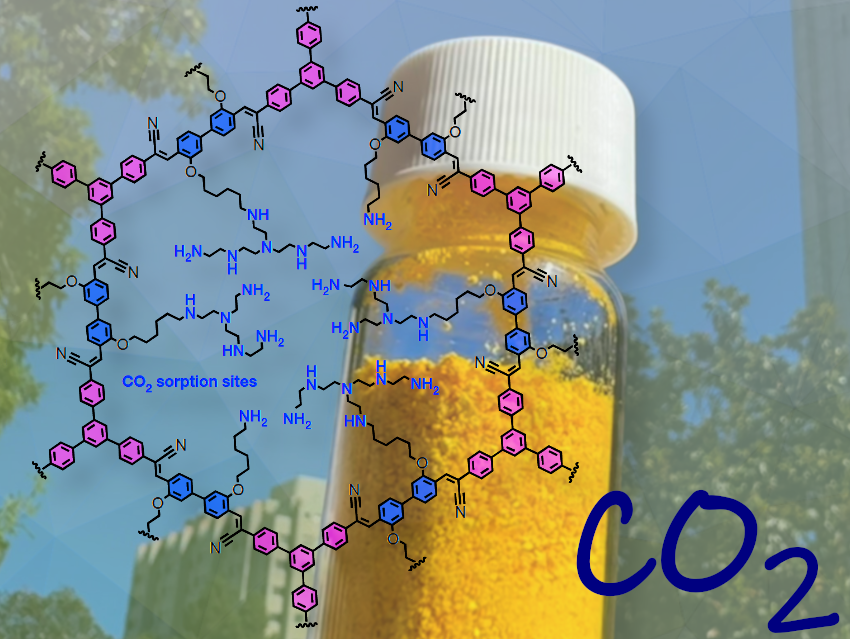 |
Interview: Chemical Solution to the CO2 Problem |

Can we harvest drinking water directly from the air around us? – Examples from nature and research
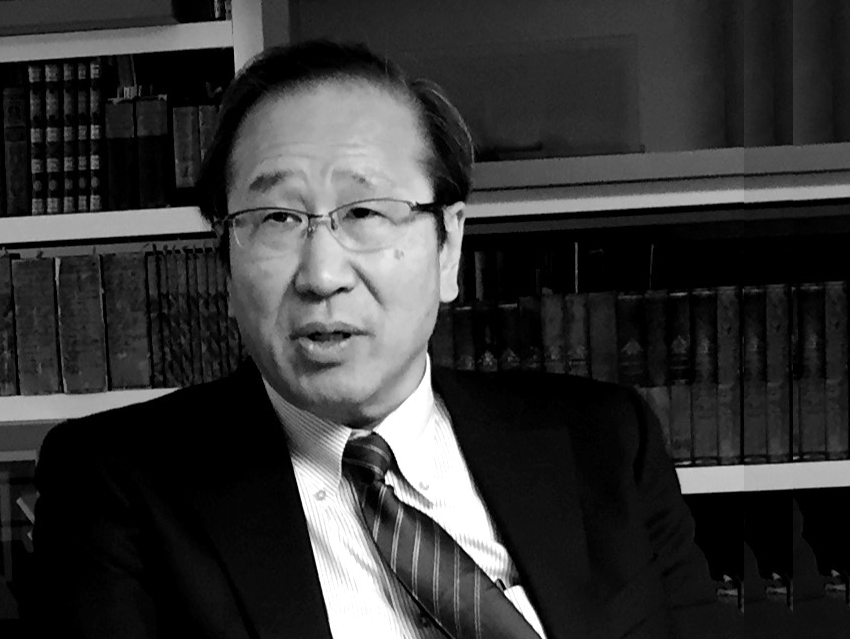
Susumu Kitagawa, Kyoto University, Japan, explains his research
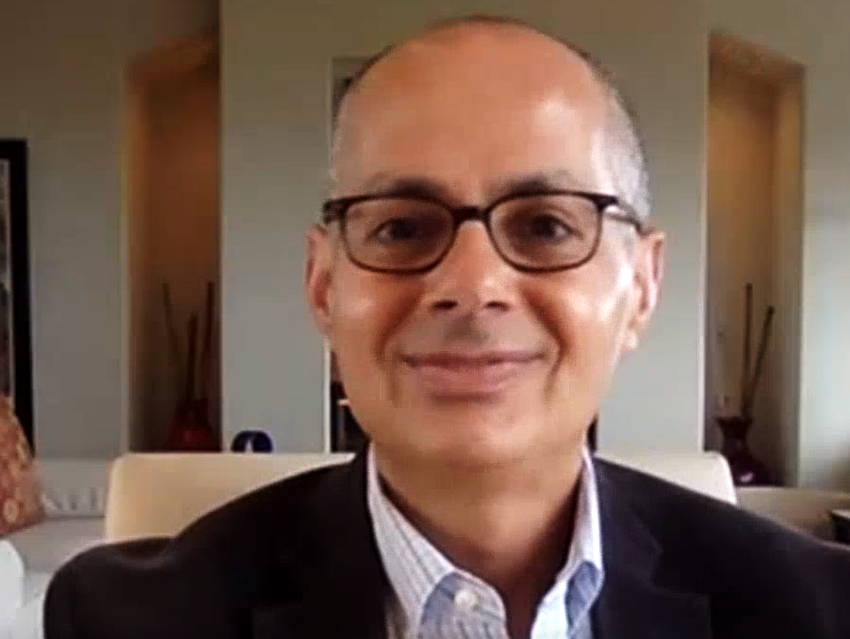
Omar M. Yaghi about his research, the discovery of MOFs, supporting young academics, and our responsibility as scientists
- Nobel Prize in Chemistry 2024,
David Baker, USA, is honored for his work in computational protein design, the other half is shared by Demis Hassabis and John M. Jumper, both UK, for their contributions to protein structure prediction - Collection: Nobel Prize in Chemistry
Collection of interviews with Nobel Laureates and Nobel Prize quizzes

